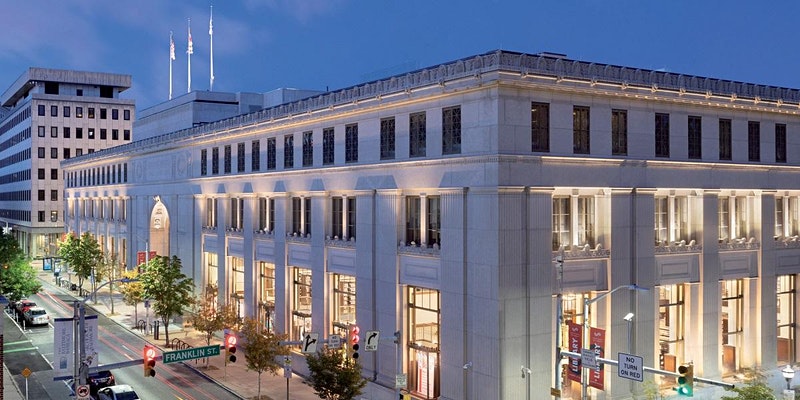Sandra Vicchio and Jillian Storms discuss the design of the Pratt Central Library, one of Baltimore’s most beloved buildings.
The Pratt Central Library achieved second place in BAF’s Architecture Madness tournament of Baltimore’s best buildings built between 1870 and today and hosted in celebration of AIA Baltimore’s 150th anniversary. In today’s Virtual History, we’ll explore what makes this library so special and how it served as a national model for libraries that followed.
In 1882, Enoch Pratt gave a whopping $1 million gift to Baltimore City to launch the nation’s first free library system, proclaiming, “My library shall be for all, rich and poor without distinction of race or color…” This welcoming vision was echoed in the 1929 design of the system’s new central branch, starting with its street-level main entrance on Cathedral Street, going against the grain of architectural design for grand civic institutions at the time. Architect Clyde N. Friz hoped to give the library “a dignity characterized by friendliness rather than aloofness” avoiding the old-fashioned institutional character of past libraries. When Baltimore’s Central Library opened on Cathedral Street in 1933, it displayed its featured content in large bay windows along its street facade enticing all to enter, much like department stores on nearby Howard Street.
Today, the Central Library serves more than half a million people a year and recently received a $115 million, three-year renovation. Its exterior and interiors were gorgeously restored and fully transformed for the digital age with up-to-date systems and technology masterfully integrated into the historic fabric. Dropped ceilings were removed to reveal fabulous stenciling, decorative molding damaged in prior renovations was restored by artisans, and historically appropriate new lighting was installed to make the rooms feel light and airy. The results are stunning.
Come join us as we hear from our two presenters about this award-winning library, inviting and comfortable for all who enter, and one that will fill you with civic pride. Gordon Krabbe, Chief Operating Officer of the Enoch Pratt Free Library, will be introducing our presenters.
About the Presenters:
Jillian Storms, AIA, has done extensive architectural research on numerous architects who practiced in Maryland, including Clyde N. Friz, AIA, who holds the first architectural licence issued by the State of Maryland. She is a former President of the BAF and now serves as co-chair of its research committee, the Dead Architects’ Society. She serves as a capital programs manager at the School Facilities Branch of the Maryland State Department of Education.
Sandra Parsons Vicchio, AIA, NCARB, LEED AP, is founding principal of Sandra Vicchio & Associates, LLC, with more than 30 years of experience in programming, planning, architecture, and design. Her portfolio includes historic preservation, renovation, and new construction encompassing laboratory, office, academic, administrative, visitor center, library, and museum spaces. She co-authored the 2015 book The Living Library: An Intellectual Ecosystem and served as consulting architect on the Pratt Central Library renovation project team, along with lead architects, Beyer Blinder Belle, and managing architects, Ayers Saint Gross.
About this event
This program is hosted on Zoom. Upon registering you will receive an email confirmation and a Zoom link. If you do not receive a link, please contact ndennies@aiabalt.com. If you do not contact us at least 1 hour prior to the start of the program, we cannot guarantee admittance.
The Baltimore Architecture Foundation (BAF) and Baltimore Heritage present the Virtual Histories Series: 30 minute live virtual tours and presentations focusing on Baltimore architecture, preservation and history. Hosted every Friday at 1:00 pm EST. This special program is hosted in partnership with the George Peabody Library.
Tickets are donation based. We encourage you to give what you can to support BAF and Baltimore Heritage. Your support helps us make up for lost tour and program revenue from COVID-19 and create more virtual programs like this.

